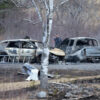On August 2, Roma activists and allies across Canada are commemorating Romani and Sinti Genocide Day. First recognized by Canada in 2018, the day recognizes the genocide of Roma people during the Holocaust.
Roma activists have organized a panel which will be streamed live on Facebook at 11ET at the following link: https://www.facebook.com/events/221112942452627
The panel, featuring Roma historians and advocates along with human rights activists from a number of groups, will address the history and contemporary challenges Roma people face across the world and in Canada. These include removal, imprisonment and surveillance, stigma, lack of access to health and education, and gendered violence.
In Canada, Roma people face deportation despite being in danger in their countries of origin. El Jones, an advocate for migrant and prisoners’ rights who is participating in the panel says:
Until recently in Canada, Roma people faced systemic discrimination at refugee panel hearings, and even today, removals of Roma people are still taking place. We are particularly concerned with the removals of Roma women, who face life-threatening conditions due to gendered and ethnic discrimination in their countries of origin. Roma people are often stateless, and are victims of historical and ongoing persecution. For many Roma, the conditions we commemorate today are not in the past. It is our hope that today’s panel helps to raise awareness in Canada about the conditions Roma people experience and that Canada fulfills our duties under international law to protect the rights and lives of Roma people.
It is important to me to participate in the panel today as a Black woman. We recognize that our struggles against racism and state violence are mirrored in the experiences of Roma people, and we stand together with all people facing discrimination and persecution due to their ethnic origin.
Roksana Hajrizi, a queer Roma woman who organized today’s panel, is an activist for Roma rights who has been fighting against the deportations of her family members. Arriving in Canada in 1997 as refugees from the Bosnian War, Roksana, her sister, and her mother and father have all struggled for status in Canada. While Roksana and her sister have had their deportations stayed, her father was deported and her mother Celina Urbanowicz currently faces removal. Today’s event is significant for Roksana:
The Liberal government is the first government in Canadian history that has acknowledged the Roma genocide. I am also heartened by Deputy Prime Minister Chrystia Freeland’s recognition of the gendered violence faced by Roma women.
I descend from family members who were killed in the Holocaust – today is a painful day not only because of the weight of their histories, but also because my family still faces separation and removal. Roma people continue to be dispersed and displaced, conditions that have haunted us for centuries. I fear for my mother’s life if she is removed from Canada.
But today, I am also feeling hope. Hope because allies from other groups are participating with us in telling our stories. Hope because Canada has acknowledged our terrible history and because our suffering is not being ignored. And hope that people like my mother will find justice, the justice so long denied our people.
Viewers of the panel are asked to sign a petition asking the government to intervene in Celina’s deportation. The petition can be found here: https://www.change.org/p/help-stop-my-mom-s-deportation-to-persecution
Please join the Roma community on this solemn day to commemorate the Roma genocide during the Holocaust, and to bring awareness to the struggles Roma people still face.
Media Contact:
Roksana Hajrizi
Email: hamburg1998@hotmail.com



